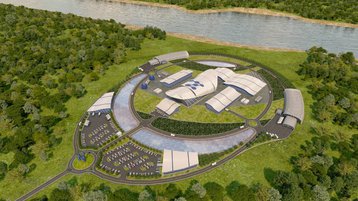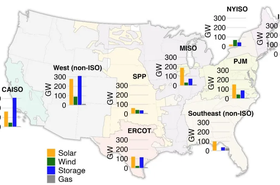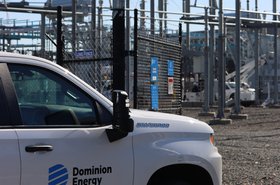Plans to build the US' first small modular reactor (SMR) in Idaho have been canceled.
The power utility Utah Associated Municipal Power Systems (UAMPS), and the reactor company NuScale, have announced they will cancel the Carbon Free Power Project (CFPP), a small modular reactor (SMR) project that was to be built at the Idaho National Laboratory (INL).
The data center industry has recently been eyeing up SMRs as a cost-effective way to acquire low-carbon energy. NuScale has signed a deal with blockchain firm Standard Power to build 24 of the units, each providing 77MW. However, in recent weeks, NuScale has faced investigation by lawyers, after a short seller report claimed that the Standard Power deal was likely to fail.
“We're happy for the communities and ratepayers who have dodged a huge financial debacle as a result of the cancellation of NuScale and UAMPS' proposed SMR project," said David Schlissel, director of resource planning analysis at the Institute for Energy Economics and Financial Analysis (IEEFA) and author of a critical 2022 analysis of the project.
"As we have repeatedly shown, this project and the other SMRs that are being hyped by the nuclear industry and its allies are simply too late, too expensive, too uncertain, and too risky," said Schlissel. "There are less risky and more proven alternatives for addressing growing energy needs and the global warming crisis.”
Explaining the decision, a joint statement on the UAMPS site yesterday said: “Despite significant efforts by both parties to advance the CFPP, it appears unlikely that the project will have enough subscription to continue toward deployment. UAMPS and NuScale have mutually determined that ending the project is the most prudent decision for both parties.”
UAMPS, a non-profit utility owned by the State of Utah, which provides power to states in the inter-mountain region, originally planned the CFPP to include 12 NuScale SMR power modules delivering 720MW. The project was due to be funded by subscriptions from towns in the region, but it was scaled back to six modules (462MW) when these subscriptions lagged.
"All indications were that the project was on schedule for the first NuScale Power Module to begin generating power in 2029, with the remaining modules coming online for full plant operation by 2030" reports Aaron Larson on Power, "but the project came to an abrupt halt on Wednesday."
The decision was welcomed by Rusty Cannon, president of the Utah Taxpayers Association, in a statement: “As we have said for many years, taxpayer-funded entities should not be acting as venture capitalists on risky projects, no matter what the nature of the project is. This welcome news for taxpayers in Utah confirms what reasonable voices surrounding this project have known and spoken about for years- that it was doomed to fail.”
Warning bells had been sounded since at least November 2022, when Schlissel's IEEFA report said that the project's cost estimates had "ballooned" from $55 per megawatt-hour (MWh) to a "shocking" $90-$100 MWh, leaving the project’s future in serious doubt.
Schlissel pointed to "the long history of delayed and over-budget projects that have plagued the nuclear industry," warning that the project would require even bigger subsidies from federal taxpayers.
In 2020, the Department of Energy gave the CFPP a $1.4bn subsidy. Cannon commented: "It’s uncertain what will happen to federal subsidy now that the project has been terminated."
In recent CFPP project management meetings, CFPP project director Shawn Hughes had reported that CFPP had met or exceeded all planned milestones, and was on track to get the necessary license from the Nuclear Regulatory Commission.
UAMPS remained positive in October, saying: “The project’s progress not only represents major achievements for CFPP as a specific entity but also within the broader context of the development of small modular nuclear reactors.”
But potential subscribers were not convinced and refused to sign up for the higher power prices, leading to the decision to pull the plug. UAMPS CEO Mason Baker said (in the release): “This decision is very disappointing given the years of pioneering hard work put into the CFPP by UAMPS, CFPP LLC, NuScale, US Department of Energy, and the UAMPS member communities that took the leadership role to launch the CFPP."
NuScale CEO John Hopkins put a positive light on the decision: “Through our work with UAMPS and our partnership with the US Department of Energy [DOE], we have advanced our NuScale Power Modules to the point that utilities, governments, and industrials can rely on a proven small modular reactor (SMR) technology that has regulatory approval and is in active production."
Although CFPP had been canceled, he said that in 10 years of work, NuScale had reached a milestone of having an SMR ready for commercial deployment, and promised to build on this: “NuScale will continue with our other domestic and international customers to bring our American SMR technology to market and grow the US nuclear manufacturing base, creating jobs across the US. We thank UAMPS for the collaboration that has enabled this advancement.”
As well as the controversial Standard Power deal, NuScale has an agreement with Nucor Corporation, to explore using SMRs to power steel mills which create metal from recycled steel. NuScale is also researching using nuclear power to make hydrogen with Shell.
The company has also initiated a project aimed at building an SMR in Poland.
NuScale's shares had already fallen 80 percent, since a high of nearly $15 in August 2022, to around $3 yesterday. Since the announcement, they have dropped to around $2.




